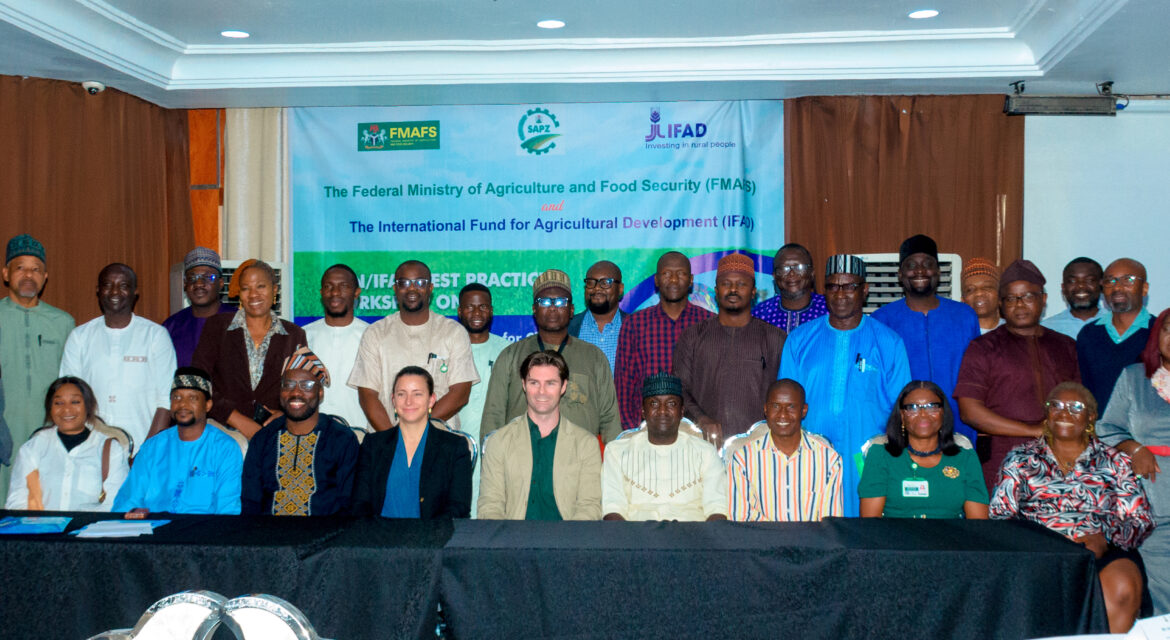The Federal Government has called for stronger collective action to protect Nigeria’s food systems from the growing threats of climate change. The call was made during the FGN/IFAD Best Practice Workshop on Public-Private Partnerships (PPP) for Climate Information Services and consultations on the Climate-Smart Agribusiness Partnership for Resilience (CSAPR) Project, held in Abuja.
Speaking on behalf of the Federal Ministry of Agriculture and Food Security, Mr. Ibrahim Tanimu, Director of Planning and Policy Coordination, emphasized that climate change poses one of the greatest risks to agriculture in Nigeria and across Africa. Erratic rainfall, prolonged droughts, and extreme weather continue to undermine farmers’ livelihoods, rural economies, and national food security.
He stressed that under the Renewed Hope Agenda of President Bola Ahmed Tinubu, the Federal Government has prioritized climate-resilient agriculture as a central pillar of development. This commitment is reflected in national policies and frameworks such as the National Agriculture Technology and Innovation Policy (NATIP), the CAADP Kampala Declaration, and Nigeria’s Food Systems Transformation Pathways, which provide direction for building a more resilient and inclusive agricultural sector.
According to him, the workshop and consultations aimed to:
• Share best practices on PPPs for Climate Information Services.• Identify opportunities to leverage private sector investment to expand farmers’ access to climate data.
• Strengthen national ownership and finalize strategies for successful implementation of the CSAPR project.
Mr. Tanimu expressed appreciation to development partners, the private sector, farmer organizations, and MDAs, while highlighting the critical support of IFAD, NiMet, the Federal Ministry of Budget and Economic Planning, AfDB, and IsDB in driving agricultural resilience and transformation.
IFAD’s Call for Urgent Action
Delivering a high-level remark, Mrs. Dede Ekoue, IFAD Country Director, described the workshop theme as both forward-looking and urgent. She recalled outcomes of the recent UN Food Systems Summit +4 in Addis Ababa, where leaders reaffirmed the need for resilience, inclusivity, and sustainability in food systems.
She emphasized that Nigeria has shown leadership at the national, regional, and global levels in promoting climate-smart agriculture, digital innovations, and stronger partnerships with the private sector. According to her, these priorities align with IFAD’s strategic direction, including its support to programmes such as the Value Chain Development Programme (VCDP), Livelihood Improvement Family Enterprises – Niger Delta (LIFE-ND), and the Special Agro-Industrial Processing Zones (SAPZ).
Mrs. Ekoue stressed that climate information services (CIS) are not merely technical tools but life-saving and productivity-enhancing instruments. Farmers, she said, need timely and reliable information to decide when to plant or harvest, while agribusinesses require accurate data and early warning systems to scale sustainably.
NiMet’s Position on Climate-Smart PPPs
The Director-General/CEO of the Nigerian Meteorological Agency (NiMet), Prof. Charles Anosike, highlighted the critical role of Climate-Smart PPPs in addressing climate risks. He called for integrating climate data, adaptation, and mitigation measures into agricultural and infrastructure project design to ensure long-term sustainability.
Prof. Anosike commended IFAD for its consistent support through various projects and revealed that NiMet is actively collaborating with private sector actors to establish Digital Climate Advisory Services (DCAS). These services are intended to provide smallholder farmers with timely, accurate, and user-friendly climate information to boost yields, protect livelihoods, and build resilience.
Way Forward
Declaring the workshop open, Mr. Tanimu urged stakeholders, including government agencies, private sector players, farmer organizations, and development partners to actively share experiences and adopt global best practices.
He concluded with a call to action: “Let us together chart a clear pathway for building a robust, inclusive, and climate-resilient agricultural sector in Nigeria.”
The workshop was jointly organized by the Federal Ministry of Agriculture and Food Security, IFAD, and NiMet, with strong support from the Federal Ministry of Budget and Economic Planning and the SAPZ programme.

